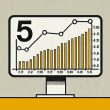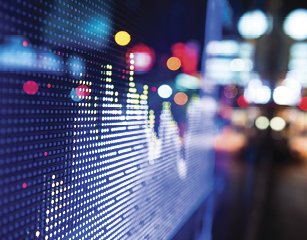by Jurrien Timmer, Director of Global Macro, Fidelity Investments
One of the traditions of Burning Man is the decompression that follows. Burning Man can get overwhelming and us burners get so entrenched into our experiment of temporary community that it can be difficult to transition back into the default world. So, over the past week or two there have been countless of decompression events around the world, including for our camp, where fellow burners break bread together in their locales and collectively debrief from what in many people’s minds was one of the best burns ever.
Decompressions can be smooth or difficult, making this year not a bad analogy for how the market is faring while transitioning from its compressed state of concentrated leadership to a broader decompressed state. So, let’s review where we are in the cycle.
For the S&P 500 cap-weighted index and most other indices (but not all), we are in week 100 (day 701) of this bull market, with a 62% cumulative gain. For the equal-weighted index, it has been a more modest ride at 41%, but still respectable. The Russell 2000 has delivered a 33% return, and the MSCI All-Country World index (ACWI) has delivered a 57% return.

With the Fed believed to be on the cusp of an easing cycle while the US economy remains in an expansion, the market is in the sweet spot of the market cycle (top left quadrant below). Financial conditions have remained favorable while earnings have been growing and the cost of capital has been coming down. Meanwhile, the average stock in the S&P 500 has been trading at a 18x multiple and the leadership has broadened. What’s not to like?

After the volatility scare a few weeks ago, the major indices are closing back in on their all-time high set in mid-July. The storm seems to have passed for now, and the VIX is back in line with both credit spreads and the equity risk premium. Decompression.

A big question overhanging the market is whether the broadening that has been underway since mid-July can continue without dragging down the overall index. The early rotation a few months ago was so severe that the index was not spared, but the current rotation has been more forgiving.

Indeed, both the cap-weighted and equal-weighted indices are back near their respective all-time highs, while the correlation between the two has returned to normal (where it belongs). The rising tide is lifting all boats, at least for now.

The Fed’s long awaited FOMC meeting is next week, and all eyes are on whether the Fed goes with a traditional 25 bps cut or a jumbo cut of 50 bps. This was the top question asked of me while doing my media tour in NYC last week, and my answer was that it doesn’t really matter. Based on all metrics (from inflation to unemployment), it is clear that the Fed has plenty of room to cut. In my view, a neutral rate is around 3.5-4%, which suggests that the Fed can cut rates 6-7 times. It could do so gradually or swiftly, but it can easily justify a 50 bps cut next week by saying that it waited longer than normal to start cutting, so now it is making up for it.

More important than the speed of rate cuts is the terminal point of the cycle. The forward curve is pricing in 2.8%, which seems a bit ambitious to me, but the ending point is a conversation for next year. What we do know is that the start of a rate cutting cycle is more often than not bullish for equities, per the chart below. The two major outliers were 2001 and 2008, which were perfect storms of simultaneously falling earnings and valuations.

It's of note that this rate cutting cycle comes at a time when the “damage” of a restrictive Fed has not been widespread (hence the soft landing narrative). Yes, the cost of capital for homeowners and businesses has been high, and for them this will rate cycle be a welcome reprieve.

But for the banks (the lifeblood of the economy), the damage has been limited, outside the smaller regional banks and community banks which felt the heat in March 2023. For the mega banks, the yield curve never inverted (which is why I think the signal for the market has been limited), and those banks continue to fund their loan book with deposits costing them 0.5%. Also, as the chart shows below, bank reserves remain more than ample, even after a significant tightening cycle. So here comes an easing cycle with reserves above pre-pandemic levels.

The prospect of a new liquidity cycle amid an ongoing regime of fiscal expansion has not been lost on the price of gold.

If the Fed can freeze the cycle here, it will have successfully threaded the needle by correcting the excess labor demand in the economy without triggering a recession. The main worry is that the unemployment pendulum rarely stops swinging once it’s in motion.

But for now, we are in the sweet spot of growing earnings and stable valuations (at least for the broader market).

Earnings estimates are being supported by relatively easy financial conditions.

Rising earnings estimates are also supported by a growing topline, which is in turn also feeding capex, dividends, and share buybacks.

A modestly falling dollar (shown here on a reverse scale) has also been helpful to earnings estimates.

Whether the dollar keeps falling will likely depend on interest rate differentials. With the forward curve already pricing in a sub-3% fed funds rate, my guess is that yields have gone as far as they can for now. That suggests that the dollar could stay stuck in its trading range for a while longer.

Finally, the presidential cycle remains favorable, albeit not for too much longer. Perhaps this powerful cycle will compensate for the otherwise wobbly seasonal pattern that we are now in.

All in all, it appears earnings are growing, rates are coming down, the economy is slowing but growing, and the average stock trades at a reasonable multiple. Yes, we are likely in the back innings for both this cyclical and secular regime, but for now, what’s not to like?
The main worry from my end is that the headline indices may not be able to advance much amid an ongoing rotation out of the mega growers into everything else. A broad-based and active exposure seems like the best way to navigate.
This information is provided for educational purposes only and is not a recommendation or an offer or solicitation to buy or sell any security or for any investment advisory service. The views expressed are as of the date indicated, based on the information available at that time, and may change based on market or other conditions. Opinions discussed are those of the individual contributor, are subject to change, and do not necessarily represent the views of Fidelity. Fidelity does not assume any duty to update any of the information.
Copyright © Fidelity Investments













